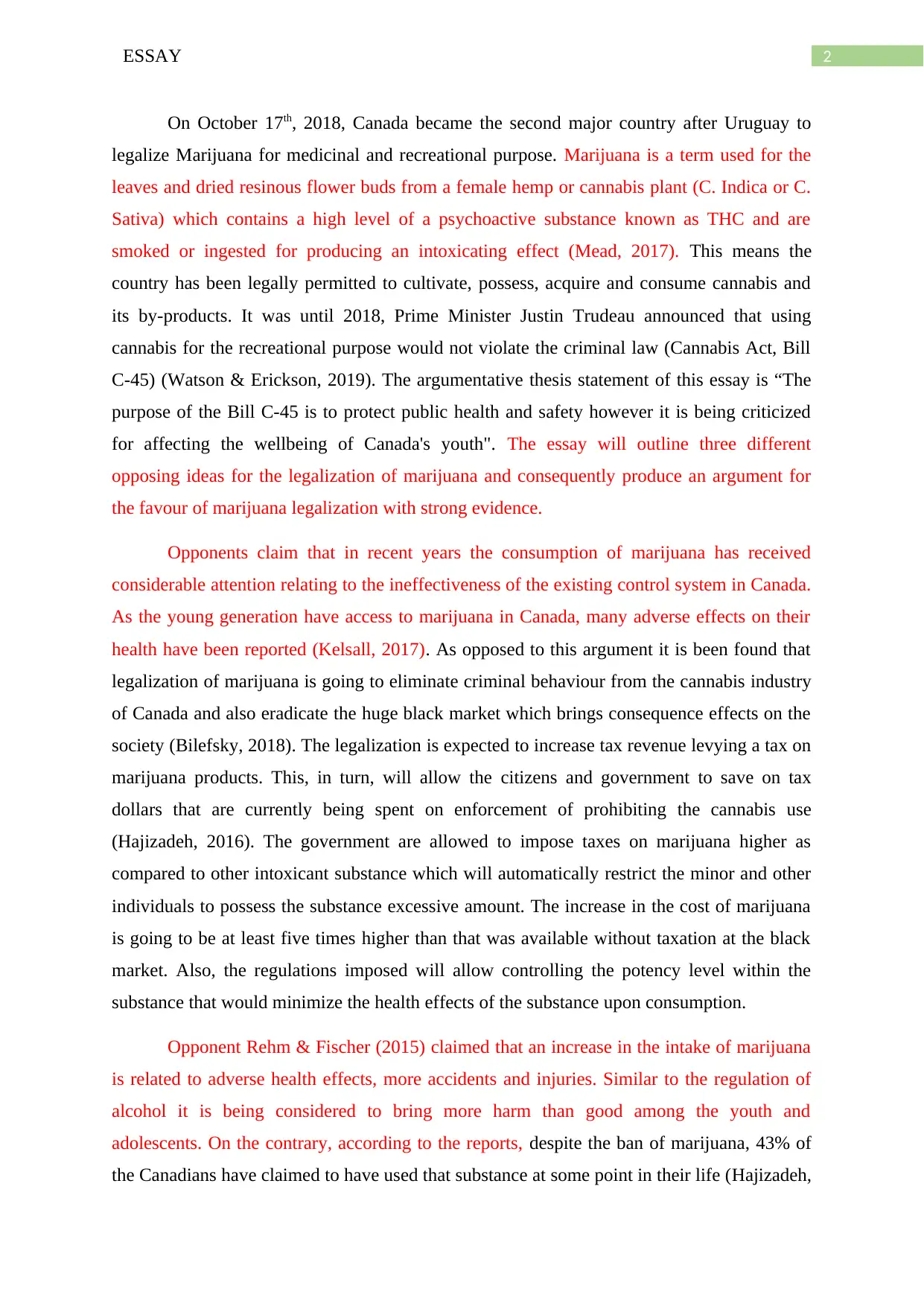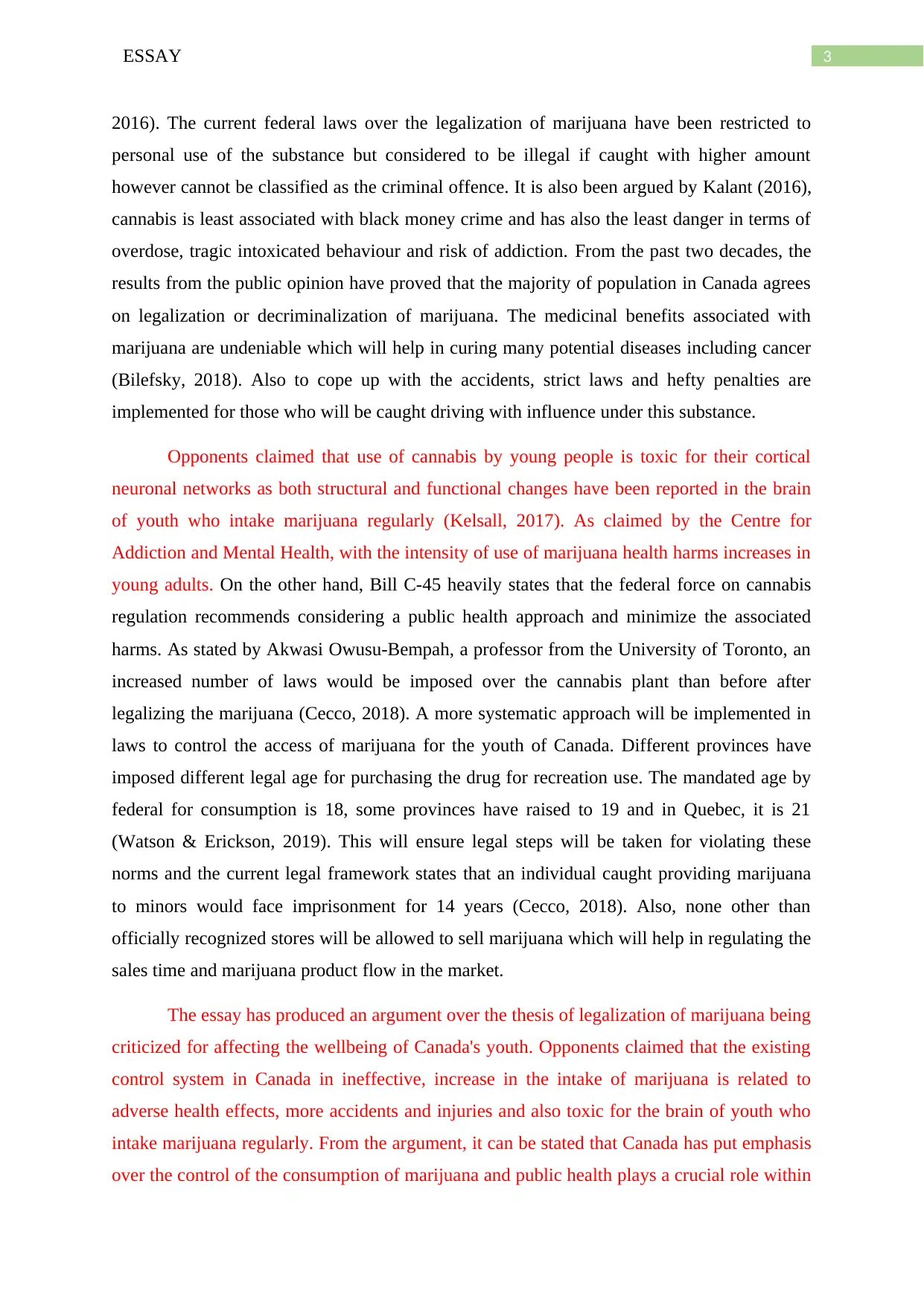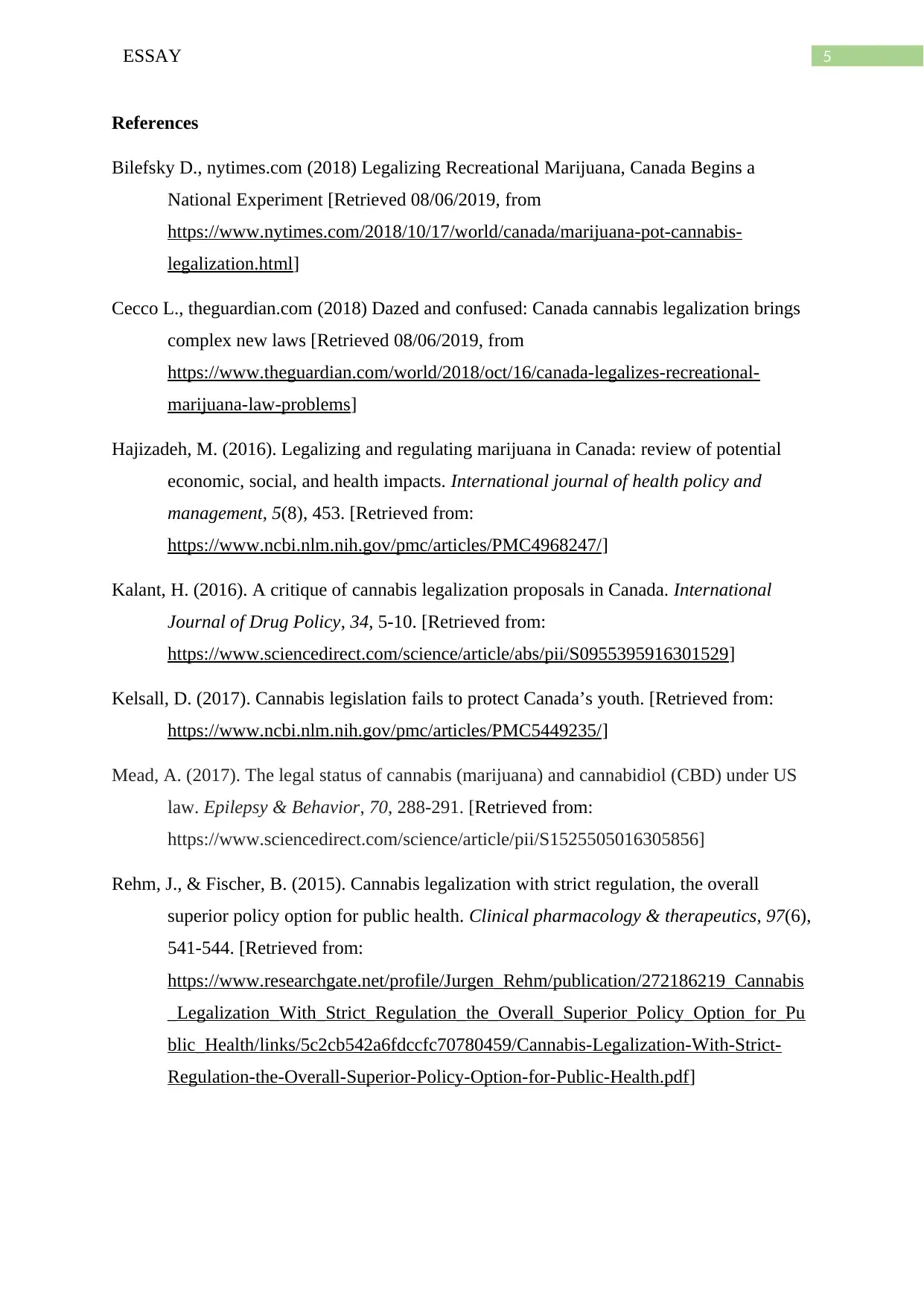The Debate Over Marijuana Legalization in Canada: An Essay
VerifiedAdded on 2022/12/30
|6
|1379
|45
Essay
AI Summary
This essay analyzes the legalization of marijuana in Canada, focusing on Bill C-45 and its implications for public health and safety, particularly concerning the youth. The essay presents an argumentative thesis, exploring opposing viewpoints on the effects of legalization. It discusses arguments that legalization eliminates criminal behavior and generates tax revenue, while also acknowledging concerns about adverse health effects, accidents, and potential harm to young people. The essay references various studies and reports, including those by Rehm & Fischer, Hajizadeh, Kelsall, and others, to support the arguments. It highlights the government's efforts to regulate the industry, control potency levels, and impose restrictions to minimize health risks, including age limits and sales regulations. The essay concludes by emphasizing the importance of public health considerations within the legal framework and the ongoing debate surrounding the impact of marijuana legalization in Canada.

Running Head: ESSAY
ESSAY
ESSAY
Paraphrase This Document
Need a fresh take? Get an instant paraphrase of this document with our AI Paraphraser

2ESSAY
On October 17th, 2018, Canada became the second major country after Uruguay to
legalize Marijuana for medicinal and recreational purpose. Marijuana is a term used for the
leaves and dried resinous flower buds from a female hemp or cannabis plant (C. Indica or C.
Sativa) which contains a high level of a psychoactive substance known as THC and are
smoked or ingested for producing an intoxicating effect (Mead, 2017). This means the
country has been legally permitted to cultivate, possess, acquire and consume cannabis and
its by-products. It was until 2018, Prime Minister Justin Trudeau announced that using
cannabis for the recreational purpose would not violate the criminal law (Cannabis Act, Bill
C-45) (Watson & Erickson, 2019). The argumentative thesis statement of this essay is “The
purpose of the Bill C-45 is to protect public health and safety however it is being criticized
for affecting the wellbeing of Canada's youth". The essay will outline three different
opposing ideas for the legalization of marijuana and consequently produce an argument for
the favour of marijuana legalization with strong evidence.
Opponents claim that in recent years the consumption of marijuana has received
considerable attention relating to the ineffectiveness of the existing control system in Canada.
As the young generation have access to marijuana in Canada, many adverse effects on their
health have been reported (Kelsall, 2017). As opposed to this argument it is been found that
legalization of marijuana is going to eliminate criminal behaviour from the cannabis industry
of Canada and also eradicate the huge black market which brings consequence effects on the
society (Bilefsky, 2018). The legalization is expected to increase tax revenue levying a tax on
marijuana products. This, in turn, will allow the citizens and government to save on tax
dollars that are currently being spent on enforcement of prohibiting the cannabis use
(Hajizadeh, 2016). The government are allowed to impose taxes on marijuana higher as
compared to other intoxicant substance which will automatically restrict the minor and other
individuals to possess the substance excessive amount. The increase in the cost of marijuana
is going to be at least five times higher than that was available without taxation at the black
market. Also, the regulations imposed will allow controlling the potency level within the
substance that would minimize the health effects of the substance upon consumption.
Opponent Rehm & Fischer (2015) claimed that an increase in the intake of marijuana
is related to adverse health effects, more accidents and injuries. Similar to the regulation of
alcohol it is being considered to bring more harm than good among the youth and
adolescents. On the contrary, according to the reports, despite the ban of marijuana, 43% of
the Canadians have claimed to have used that substance at some point in their life (Hajizadeh,
On October 17th, 2018, Canada became the second major country after Uruguay to
legalize Marijuana for medicinal and recreational purpose. Marijuana is a term used for the
leaves and dried resinous flower buds from a female hemp or cannabis plant (C. Indica or C.
Sativa) which contains a high level of a psychoactive substance known as THC and are
smoked or ingested for producing an intoxicating effect (Mead, 2017). This means the
country has been legally permitted to cultivate, possess, acquire and consume cannabis and
its by-products. It was until 2018, Prime Minister Justin Trudeau announced that using
cannabis for the recreational purpose would not violate the criminal law (Cannabis Act, Bill
C-45) (Watson & Erickson, 2019). The argumentative thesis statement of this essay is “The
purpose of the Bill C-45 is to protect public health and safety however it is being criticized
for affecting the wellbeing of Canada's youth". The essay will outline three different
opposing ideas for the legalization of marijuana and consequently produce an argument for
the favour of marijuana legalization with strong evidence.
Opponents claim that in recent years the consumption of marijuana has received
considerable attention relating to the ineffectiveness of the existing control system in Canada.
As the young generation have access to marijuana in Canada, many adverse effects on their
health have been reported (Kelsall, 2017). As opposed to this argument it is been found that
legalization of marijuana is going to eliminate criminal behaviour from the cannabis industry
of Canada and also eradicate the huge black market which brings consequence effects on the
society (Bilefsky, 2018). The legalization is expected to increase tax revenue levying a tax on
marijuana products. This, in turn, will allow the citizens and government to save on tax
dollars that are currently being spent on enforcement of prohibiting the cannabis use
(Hajizadeh, 2016). The government are allowed to impose taxes on marijuana higher as
compared to other intoxicant substance which will automatically restrict the minor and other
individuals to possess the substance excessive amount. The increase in the cost of marijuana
is going to be at least five times higher than that was available without taxation at the black
market. Also, the regulations imposed will allow controlling the potency level within the
substance that would minimize the health effects of the substance upon consumption.
Opponent Rehm & Fischer (2015) claimed that an increase in the intake of marijuana
is related to adverse health effects, more accidents and injuries. Similar to the regulation of
alcohol it is being considered to bring more harm than good among the youth and
adolescents. On the contrary, according to the reports, despite the ban of marijuana, 43% of
the Canadians have claimed to have used that substance at some point in their life (Hajizadeh,

3ESSAY
2016). The current federal laws over the legalization of marijuana have been restricted to
personal use of the substance but considered to be illegal if caught with higher amount
however cannot be classified as the criminal offence. It is also been argued by Kalant (2016),
cannabis is least associated with black money crime and has also the least danger in terms of
overdose, tragic intoxicated behaviour and risk of addiction. From the past two decades, the
results from the public opinion have proved that the majority of population in Canada agrees
on legalization or decriminalization of marijuana. The medicinal benefits associated with
marijuana are undeniable which will help in curing many potential diseases including cancer
(Bilefsky, 2018). Also to cope up with the accidents, strict laws and hefty penalties are
implemented for those who will be caught driving with influence under this substance.
Opponents claimed that use of cannabis by young people is toxic for their cortical
neuronal networks as both structural and functional changes have been reported in the brain
of youth who intake marijuana regularly (Kelsall, 2017). As claimed by the Centre for
Addiction and Mental Health, with the intensity of use of marijuana health harms increases in
young adults. On the other hand, Bill C-45 heavily states that the federal force on cannabis
regulation recommends considering a public health approach and minimize the associated
harms. As stated by Akwasi Owusu-Bempah, a professor from the University of Toronto, an
increased number of laws would be imposed over the cannabis plant than before after
legalizing the marijuana (Cecco, 2018). A more systematic approach will be implemented in
laws to control the access of marijuana for the youth of Canada. Different provinces have
imposed different legal age for purchasing the drug for recreation use. The mandated age by
federal for consumption is 18, some provinces have raised to 19 and in Quebec, it is 21
(Watson & Erickson, 2019). This will ensure legal steps will be taken for violating these
norms and the current legal framework states that an individual caught providing marijuana
to minors would face imprisonment for 14 years (Cecco, 2018). Also, none other than
officially recognized stores will be allowed to sell marijuana which will help in regulating the
sales time and marijuana product flow in the market.
The essay has produced an argument over the thesis of legalization of marijuana being
criticized for affecting the wellbeing of Canada's youth. Opponents claimed that the existing
control system in Canada in ineffective, increase in the intake of marijuana is related to
adverse health effects, more accidents and injuries and also toxic for the brain of youth who
intake marijuana regularly. From the argument, it can be stated that Canada has put emphasis
over the control of the consumption of marijuana and public health plays a crucial role within
2016). The current federal laws over the legalization of marijuana have been restricted to
personal use of the substance but considered to be illegal if caught with higher amount
however cannot be classified as the criminal offence. It is also been argued by Kalant (2016),
cannabis is least associated with black money crime and has also the least danger in terms of
overdose, tragic intoxicated behaviour and risk of addiction. From the past two decades, the
results from the public opinion have proved that the majority of population in Canada agrees
on legalization or decriminalization of marijuana. The medicinal benefits associated with
marijuana are undeniable which will help in curing many potential diseases including cancer
(Bilefsky, 2018). Also to cope up with the accidents, strict laws and hefty penalties are
implemented for those who will be caught driving with influence under this substance.
Opponents claimed that use of cannabis by young people is toxic for their cortical
neuronal networks as both structural and functional changes have been reported in the brain
of youth who intake marijuana regularly (Kelsall, 2017). As claimed by the Centre for
Addiction and Mental Health, with the intensity of use of marijuana health harms increases in
young adults. On the other hand, Bill C-45 heavily states that the federal force on cannabis
regulation recommends considering a public health approach and minimize the associated
harms. As stated by Akwasi Owusu-Bempah, a professor from the University of Toronto, an
increased number of laws would be imposed over the cannabis plant than before after
legalizing the marijuana (Cecco, 2018). A more systematic approach will be implemented in
laws to control the access of marijuana for the youth of Canada. Different provinces have
imposed different legal age for purchasing the drug for recreation use. The mandated age by
federal for consumption is 18, some provinces have raised to 19 and in Quebec, it is 21
(Watson & Erickson, 2019). This will ensure legal steps will be taken for violating these
norms and the current legal framework states that an individual caught providing marijuana
to minors would face imprisonment for 14 years (Cecco, 2018). Also, none other than
officially recognized stores will be allowed to sell marijuana which will help in regulating the
sales time and marijuana product flow in the market.
The essay has produced an argument over the thesis of legalization of marijuana being
criticized for affecting the wellbeing of Canada's youth. Opponents claimed that the existing
control system in Canada in ineffective, increase in the intake of marijuana is related to
adverse health effects, more accidents and injuries and also toxic for the brain of youth who
intake marijuana regularly. From the argument, it can be stated that Canada has put emphasis
over the control of the consumption of marijuana and public health plays a crucial role within
⊘ This is a preview!⊘
Do you want full access?
Subscribe today to unlock all pages.

Trusted by 1+ million students worldwide

4ESSAY
the implementation of the legal frameworks influenced by the legalization of marijuana. It is
been thoroughly argued in this essay about the aspects of the implementation of laws that are
most likely to influence in determining better health and wellbeing of its citizens.
the implementation of the legal frameworks influenced by the legalization of marijuana. It is
been thoroughly argued in this essay about the aspects of the implementation of laws that are
most likely to influence in determining better health and wellbeing of its citizens.
Paraphrase This Document
Need a fresh take? Get an instant paraphrase of this document with our AI Paraphraser

5ESSAY
References
Bilefsky D., nytimes.com (2018) Legalizing Recreational Marijuana, Canada Begins a
National Experiment [Retrieved 08/06/2019, from
https://www.nytimes.com/2018/10/17/world/canada/marijuana-pot-cannabis-
legalization.html]
Cecco L., theguardian.com (2018) Dazed and confused: Canada cannabis legalization brings
complex new laws [Retrieved 08/06/2019, from
https://www.theguardian.com/world/2018/oct/16/canada-legalizes-recreational-
marijuana-law-problems]
Hajizadeh, M. (2016). Legalizing and regulating marijuana in Canada: review of potential
economic, social, and health impacts. International journal of health policy and
management, 5(8), 453. [Retrieved from:
https://www.ncbi.nlm.nih.gov/pmc/articles/PMC4968247/]
Kalant, H. (2016). A critique of cannabis legalization proposals in Canada. International
Journal of Drug Policy, 34, 5-10. [Retrieved from:
https://www.sciencedirect.com/science/article/abs/pii/S0955395916301529]
Kelsall, D. (2017). Cannabis legislation fails to protect Canada’s youth. [Retrieved from:
https://www.ncbi.nlm.nih.gov/pmc/articles/PMC5449235/]
Mead, A. (2017). The legal status of cannabis (marijuana) and cannabidiol (CBD) under US
law. Epilepsy & Behavior, 70, 288-291. [Retrieved from:
https://www.sciencedirect.com/science/article/pii/S1525505016305856]
Rehm, J., & Fischer, B. (2015). Cannabis legalization with strict regulation, the overall
superior policy option for public health. Clinical pharmacology & therapeutics, 97(6),
541-544. [Retrieved from:
https://www.researchgate.net/profile/Jurgen_Rehm/publication/272186219_Cannabis
_Legalization_With_Strict_Regulation_the_Overall_Superior_Policy_Option_for_Pu
blic_Health/links/5c2cb542a6fdccfc70780459/Cannabis-Legalization-With-Strict-
Regulation-the-Overall-Superior-Policy-Option-for-Public-Health.pdf]
References
Bilefsky D., nytimes.com (2018) Legalizing Recreational Marijuana, Canada Begins a
National Experiment [Retrieved 08/06/2019, from
https://www.nytimes.com/2018/10/17/world/canada/marijuana-pot-cannabis-
legalization.html]
Cecco L., theguardian.com (2018) Dazed and confused: Canada cannabis legalization brings
complex new laws [Retrieved 08/06/2019, from
https://www.theguardian.com/world/2018/oct/16/canada-legalizes-recreational-
marijuana-law-problems]
Hajizadeh, M. (2016). Legalizing and regulating marijuana in Canada: review of potential
economic, social, and health impacts. International journal of health policy and
management, 5(8), 453. [Retrieved from:
https://www.ncbi.nlm.nih.gov/pmc/articles/PMC4968247/]
Kalant, H. (2016). A critique of cannabis legalization proposals in Canada. International
Journal of Drug Policy, 34, 5-10. [Retrieved from:
https://www.sciencedirect.com/science/article/abs/pii/S0955395916301529]
Kelsall, D. (2017). Cannabis legislation fails to protect Canada’s youth. [Retrieved from:
https://www.ncbi.nlm.nih.gov/pmc/articles/PMC5449235/]
Mead, A. (2017). The legal status of cannabis (marijuana) and cannabidiol (CBD) under US
law. Epilepsy & Behavior, 70, 288-291. [Retrieved from:
https://www.sciencedirect.com/science/article/pii/S1525505016305856]
Rehm, J., & Fischer, B. (2015). Cannabis legalization with strict regulation, the overall
superior policy option for public health. Clinical pharmacology & therapeutics, 97(6),
541-544. [Retrieved from:
https://www.researchgate.net/profile/Jurgen_Rehm/publication/272186219_Cannabis
_Legalization_With_Strict_Regulation_the_Overall_Superior_Policy_Option_for_Pu
blic_Health/links/5c2cb542a6fdccfc70780459/Cannabis-Legalization-With-Strict-
Regulation-the-Overall-Superior-Policy-Option-for-Public-Health.pdf]

6ESSAY
Watson, T. M., & Erickson, P. G. (2019). Cannabis legalization in Canada: how might ‘strict’
regulation impact youth? [Retrieved from:
https://www.tandfonline.com/doi/full/10.1080/09687637.2018.1482258]
Watson, T. M., & Erickson, P. G. (2019). Cannabis legalization in Canada: how might ‘strict’
regulation impact youth? [Retrieved from:
https://www.tandfonline.com/doi/full/10.1080/09687637.2018.1482258]
⊘ This is a preview!⊘
Do you want full access?
Subscribe today to unlock all pages.

Trusted by 1+ million students worldwide
1 out of 6
Your All-in-One AI-Powered Toolkit for Academic Success.
+13062052269
info@desklib.com
Available 24*7 on WhatsApp / Email
![[object Object]](/_next/static/media/star-bottom.7253800d.svg)
Unlock your academic potential
Copyright © 2020–2026 A2Z Services. All Rights Reserved. Developed and managed by ZUCOL.
